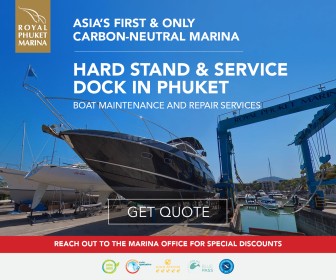Getting work done on your boat whilst long distance cruising: Cruisers Tips
This report is aimed to help cruisers thinking about getting work done on their boats by boatyards and companies in less developed countries. Whilst much of these tips, compiled from reports received by cruisers, relate to marine service companies in SE Asia and the South Pacific, much of what is said is relevant to getting yard work done anywhere in the world.
Published 8 years ago, updated 6 years ago
Please contribute your tips to help expand this report by emailing noonsite@noonsite.com or by posting a comment at the bottom of the report.
Advance Preparation
Research yards and yacht service companies in advance, however if possible, wait until you arrive in the country and have spoken to cruisers currently there before deciding who to use.
Understand fully the methods employed by the yard to lift your boat out of the water. Not all yards will have modern travel lifts, many will use cranes and/or traditional lifting methods. Be sure you are comfortable with the lifting method and it is suitable for your type of boat.
Have a good understanding in advance of materials that are available in the yard or in the local area. Advanced sourcing may be required to save time and money and in some cases, it may be more economical to bring parts with you or arrange to have them shipped in from overseas.
Set clear expectations with the yard regarding timing and your needs. Be realistic when calculating the expected length of time to do a job. There are many factors that can affect the timeframe including weather, the decisions to do extra work along the way and delays in getting hold of products and bits required to do the job. One cruiser said, “expect the job to take 50% longer than expected and probably 50% more money”.
Cost
Insist on a written quote beforehand so that both parties are aware of the costs and if possible get a fixed price. Be patient, however, quotes don’t happen overnight and it may take the company/boatyard some time to get an accurate quote together. Ensure that additional work, not on the quote is also written down and the cost agreed, hopefully, to avoid a surprise when the final bill is received.
Labour costs can be difficult to predict, however, the company you are appointing to do the work should be able to give you an estimate beforehand, and a log should be kept of hours so you can count them up once the job is complete. If at any time the hours are greatly exceeding those predicted and costs are starting to get out of control, then dialogue should be started with the company you have appointed. Many yards will not automatically be so transparent and it’s likely that you will have to specify exactly what detail you want (i.e. copies of the daily job cards).
Standard procedure in the industry is that all work undertaken in the yard must be paid for in full before your boat is re-launched (no cash, no splash). Should you have any disputes over the standard of work done or charges made, your boat will sit on the hard until your account is settled in full (costing you more money). For this reason, insist that each service order is signed and approved before work is started and that you are given progress reports and on-going bills for supplies.
Once paid, it’s highly unlikely any boatyard management will enter into any discussion or dispute.
Research freight and tax charges for getting hold of spare parts and courier companies. Certain courier companies work more effectively in some parts of the world than others. For example, in Panama FedEx & DHL deliver to marinas and work well with Yacht-in-Transit status. However, UPS deliveries always get stuck in Customs in Panama City. When and if the delivery clears customs, another courier then has to be arranged to deliver to the marina, escalating costs even more.
If ordering spare parts through the boatyard, check what charges they make for this service. The normal procedure is to charge a fee for purchasing the spare part and a profit. Whilst using the boatyard will save you time and effort in sourcing parts locally, it’s quite likely that a small part will cost as much, or more to source and purchase than the cost of the item (e.g. a $2.67 filter which required 3 phone calls and a 1 hour trip to purchase, might be billed to the customer at $8).
Labour
Low-cost labor can also mean low-skilled in the boat business. In some countries, it can be difficult finding quality workers who aspire to achieve the same high quality of work that you want. Ask around to find the best for the job, but also adjust your expectations based on work you have seen carried out on other yachts.
However helpful and accommodating the boatyard owner/manager might be, it is the skill (or otherwise) of the workers which is important. Unless the yard and the artisans employed there come highly recommended by other cruisers, close supervision of the work as it is carried out is your only safeguard.
Most of the complaints reported to Noonsite seem to hinge on insufficient supervision of relatively unskilled workers. In the main, this comes down to the difficulties in communication due to the language barrier (for those who don’t speak the local language). Cruisers advise if working with a local contractor to arrange regular daily short meetings with a translator so that you can nip any issues in the bud and resolve minor problems before they become major issues. Remember also that whilst workers may be “supervised” by the boatyard management, this will likely not amount to very much supervision at all. This is your money and your boat so pay attention and monitor what is being done to your boat at all times.
The majority of boatyards rely on sub-contractor services as it’s impossible to have all the skills in one place economically. It’s likely that some will be of questionable ability or qualification so again, get references if possible. Any sub-contractor working for the boatyard (i.e. appointed by the boatyard to work on your boat) should be fully warranted. Be sure to check this and remember if you appoint the sub-contractor yourself, quite possibly their work will not be warranted by the boatyard.
If using a yacht service company to handle all work on your boat, be cautious using “recommended” companies that do not work in-house with them. You may be better sourcing your own local workers recommended by other cruisers instead.
Bear in mind that in a lot of cultures workers rarely work alone. Whilst the second guy holding the cable ties seems unnecessary, putting somebody on a job alone is paramount to a punishment detail and in the end, the job will take twice as long.
Manage hourly workers as if they were gold. If their workday starts at 08:00, get to your boat earlier. An owner’s presence at the starting hour each morning is often enough to stem tardiness and tardy starters are often the same folks who try to leave early. If the behaviour goes unchecked by you, workers are likely to assume you don’t care. unfortunately, your outward approval of that behaviour can cause it to spread to your other workers. Good luck managing that when it happens. Your presence on the job sends a clear signal that you care about your boat and this job. It also sends the message that you are watching everyone and everything. This is a powerful and silent managing tool, which is often overlooked.
Watch everything and have endless patience.
Communication
Lack of communication between the yard and the owner is a common complaint. If you are staying on board or ashore then dropping by the office on a daily basis to keep track of things is easy to do. However, if you are leaving your boat in the hands of the boatyard while you travel out of the country, don’t rely on the yard “keeping you informed of progress”. Be sure to insist on regular reporting and be available at the end of the phone and by e-mail. Keeping in contact needs to be a two-way process to avoid any misunderstandings.
Cultural Differences
There are many idiosyncrasies in various cultures and it’s advisable to speak with cruisers who have lived in the country for some time on how best to communicate with your workers without causing offense. Alternatively, employ a middle-man who can keep the work on a track for you and liaise with the workers in their native language.
Praise expresses so many things: respect and gratitude, warm approval and admiration. If a worker does a great job, thank him personally. Sincerely thanking the worker for a job well done, while in the presence of the yard Boss, can instill pride and confidence in the worker and your words could even make his future brighter. That worker will never forget you!
Electricity
Keep a close eye on your shore power connection in the yard to avoid disconnection.
If a local electric company is providing the power to the boatyard, it’s highly likely that power outages are a common occurrence. They may also experience lightning strikes on the power line. Boats with freezers should recognize the risk of power failure, and even if living on board whilst on the hard avoid keeping any frozen food on the vessel when it’s out of the water.
If leaving the boat on the hard for an extended period, the best advice is to clear the vessel of any foodstuffs to avoid spoiling and pests.
Useful comments from cruisers:
“If you are a Westerner undertaking a major refit in an Asian country, do not speak the language, and are most likely paying a fraction of the cost you would pay back home, then a reasonable amount of giving and take is necessary. It is also important to treat people with respect and a degree of trust. While there will certainly be challenges, frustrations and miscommunications, this is part of the experience and projects are usually finished to everyone’s satisfaction”.
David and Robyn Peile, SV Maajhi Re
“One thing people say after a short time in the yard is “I wish that I had come and spent a week here talking to people before making my decision on who to employ for my job”. It is fair to say that every contractor will do his best, however his knowledge of how the end product should be and the “proper results” may be miles apart, but with all the best intentions. As a result, you end up having to educate your contractor while speaking a different language. A lot of jobs get done three times before it is right”.
Tigs and Walter, SV Marnie
A Selection of Related Noonsite Reports:
- You, the Shipyard and your Insurance Policy
- Caribbean Boatyard Safety: Good Grounding Saves Lives
- A Guide to getting work done on your boat in Thailand
- Visit Thailand for Fun – Avoid Thailand for Boat Work
- Thailand, Satun, Phithak (PSS) Shipyard: Reports from Cruisers
- Malaysia West Coast, Lumut: Pangkor Marina or “Hotel California”
- Hauling out in Seychelles
- French Polynesia, Tuamotos, Apatiki Carenage: Cruisers share their experiences
Related to the following Cruising Resources: Cruising Information, Global Yachting Services
Related to the following Services, Goods and Amenities: Marine Services, Repairs and Equipment










Advice from Rachel Robertson of Seaspray Marine Services, Langkawi:
If getting work done on your boat in Malaysia/SE Asia, it should be planned as per the seasons. The wet season here (April-November) can be a terrible time for any external work, ie painting or varnishing. Not impossible, but you have to really juggle the weather.
Recommendation for boat repairing facilities in Galapagos
On July 13. 2015 we left Galapagos Islands on our boat, Danish Blue, to go to Marquesas. About 1000 nm out, we hit something – most likely a whale. The rudder was pushed backwards and the fibreglass broke where the rudder shaft was attached.
Luckily we did not lose the rudder, but we had to bolt it tightly with bolts and pieces of wood we had on board. Also, we could not steer. To be safe, we had to return to Galapagos.
At Galapagos, we got in touch with Martin Schreyer, a German guy who lives and works at Puerto Ayora at Santa Cruz Island. He was a great help. He speaks English fluently, and he was capable of making any kind of repair on the boat such as fibreglass, welding, etc.
We needed to continue to Ecuador mainland (Stewart Yates, Puerto Lucia) to get the boat hauled out, which is not possible at Galapagos. Martin was effective and thorough – in one week he had our rudder taken out, repaired enough to work for the trip to the mainland (650 nm), put back in and fastened with stainless steel.
We were afraid we would be stuck at Galapagos for at least a month, but Martins great work made it possible for us to leave again after exactly one week.
We are so grateful for Martins help, effectiveness and expertise and wish to recommend him and his workers to anyone who needs repair done at or around the Galapagos Islands.
Martin Schreyerg’s mail is: Martinschreyerg@yahoo.com
Christians Arp-Hansen
Captain
Danish Blue, Denmark